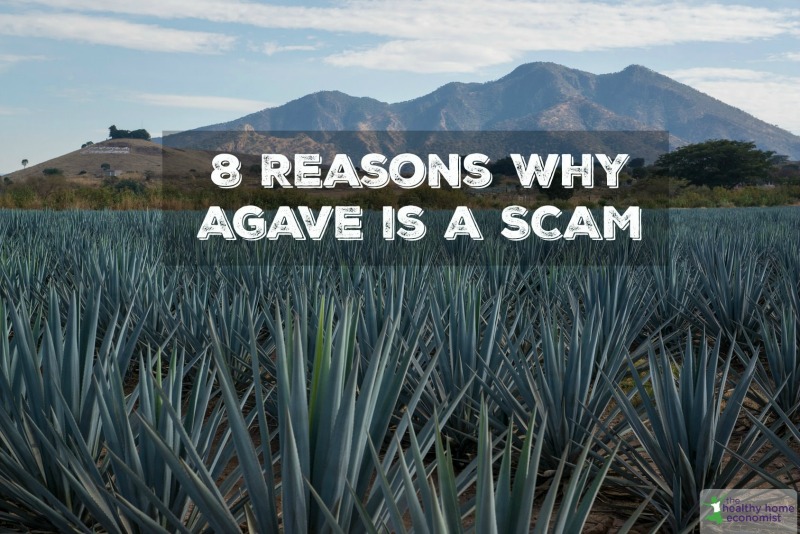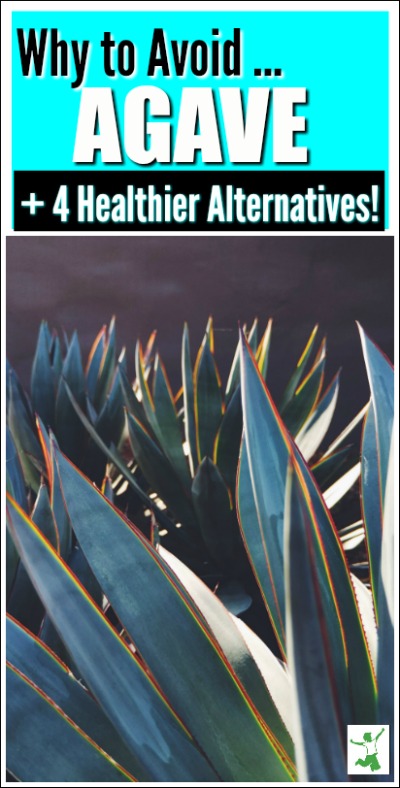Table of Contents[Hide][Show]
Reasons to avoid agave, the destructive manufacturing process required to create it, and four alternative healthy sweeteners to consider instead.

As a Health Coach since 2002, I advise people that just because something is on the shelf at the health food store does not, in fact, make it healthy.
Agave is a perfect case in point. Let’s recall other health industry scams to clue you in as to why agave nectar, whether light, amber, or blue is yet another example of the wool getting pulled over consumers’ eyes.
Recall the major scam about soy and how it was promoted (and still is) as healthy back in the early 90s.
Consumption of soy is linked to all manner of ill health, in particular, hypothyroidism.
Menopausal women who buy into the ploy of soy typically end up overweight, losing their hair, and depressed.
The effects on younger folks are no better, and for those unfortunate infants who were fed soy infant formula – well, they have a lifetime of hormonal issues to deal with once puberty hits (if it hits at all for the boys). Israel and New Zealand have banned the use of soy infant formula, by the way.
Still think it’s the best thing for your baby? Oh and please don’t put edamame in your child’s lunch thinking it’s a healthy and green snack!
Another health food scam that has persisted for decades is canola oil. Proponents generally have no idea that the name itself is short for “Canadian Oil” after the country where it was developed.
It is a genetically modified version of rapeseed oil. It is about as far from healthy as you can get where vegetable oil is concerned. Rapeseed oil, from which canola is made, is poisonous and serves as a very effective insect repellent.
Truth be told, canola oil is nothing more than an industrialized edible oil. It is produced by very violent and toxic methods. It cannot be classified as a traditional oil in any way, although clever and misleading marketing puts it in the class of olive oil. Canola oil is not healthy and should be avoided in all products and in all circumstances.
Agave Scam
Another shocking healthfood scam is agave nectar.
The alarming obesity epidemic in this country and the millions of prediabetic people have caused the term “low glycemic” to suddenly become a very appealing and marketable term.
When a food is “low glycemic”, this means that it does not spike the blood sugar as rapidly as a food that has a higher glycemic index.
Not a Healthy Sweetener
As a result, folks with blood sugar issues (about 80% of people over 25) who are avoiding sugar have been scammed into thinking agave is a healthy sweetener for them. While it is true that agave is low in sugar, agave is very very high in fructose.
The concentration of fructose in agave is actually higher than in high fructose corn syrup (HFCS)! And, though it is true that agave won’t spike your blood sugar like white sugar will, this fact does not make it healthy.
Using a concentrated fructose product like agave may spare your pancreas, but it does a number on your liver.
Metabolic syndrome, insulin resistance, fatty liver, and very dangerous belly fat can be worsened or even caused by excessive consumption of fructose which agave nectar has in spades.
8 Reasons to Avoid Agave Nectar
Next time you feel compelled to pick up a bottle of agave nectar at the health food store, consider these cautions first.
- Contrary to popular belief, agave is not made from the dried sap of the agave plant. Rather it is made from the starchy root bulb. There IS a natural agave syrup that comes exclusively from the sap made in Mexico (as is tequila). However, it is very expensive and not widely available.
- Conversion of the starchy agave root bulb into “nectar” requires a highly chemicalized and industrialized process.
- The agave manufacturing process uses genetically modified enzymes (GMOs).
- Production of agave syrup is very similar to how sugar manufacturers make high fructose corn syrup (HFCS). These types of sweeteners encourage belly fat.
- Amber-colored agave nectar is made by burning the fructose (above 140 °F) as it is being refined. There is no gourmet quality to it and it certainly does not contain more minerals than the clear, light agave syrup.
- Blue agave is no better than the amber-colored versions. It’s just a marketing ploy.
- Agave nectar is not raw even if labeled as such. Perhaps the reason is that the heat required to produce agave is below pasteurization temperature (161 °F) which then allows a misleading, untruthful “raw” label via a USDA loophole. Similar deceit is used by Organic Valley in the labeling of some of its cheeses which are labeled raw but, in fact, are not raw cheese at all.
- As consumers are becoming more aware of the problems with agave, manufacturers are starting to use “chicory syrup” instead. Be on alert for agave labeled this way to purposely mislead and deceive.
Healthy Alternatives
Need a truly healthy low glycemic sweetener? Unprocessed stevia leaf would be a good choice. It has a GI of zero, is 30 times sweeter than sugar and has been used for centuries in South America as herbal food and medicine. Avoid processed versions though!
Similar to stevia, monk fruit, also known as luo han guo, is a newer alternative sweetener available in health food stores with an excellent safety record for hundreds of years. Its intensely sweet antioxidant substances have a glycemic index of zero.
Of course, raw honey, preferably locally sourced, is an excellent choice as well.
Date syrup and granulated date sugar are excellent 100% pure fruit sweeteners.

Dangers During Pregnancy
Is agave safe during pregnancy and breastfeeding? Ask your practitioner, but according to the research, caution is advised!
- Saponins are present in the agave and yucca plants in large amounts. This toxic steroid derivative disrupts red blood cells. It should be avoided during pregnancy as it can induce a miscarriage by stimulating uterine blood flow. Beware of industry propaganda that suggests saponins increase hydration and cellular uptake of water. Saponins have no beneficial effect when consumed and any suggestion to the contrary is simply a marketing ploy. Incidentally, aquafaba, a favorite of the vegan community, is also high in saponins!
- Agave nectar labels do not conform to FDA requirements. However, so far, the FDA has no attempt to enforce violations. Hence the consumer is led to believe that store-bought agave is an unprocessed and traditional Mexican sweetener. This couldn’t be further from the truth.
- The fructose in this sweetener is not L-fructose which is the primary fructose molecule in fruit or honey. Rather, it is D-fructose which is a reverse isomer with reverse polarity to the small amounts of natural D-fructose found in fruits. Alarmingly, this means that D-fructose is not recognized by the human body like natural fructose used for energy utilization. Instead, the unnatural form of D-fructose primarily raises triglyceride levels and increases adipose (fat) tissue.
More Information
Confused about which sweeteners are healthy and which are not? The articles below provide further insights.
Yacon syrup benefits
Barley malt benefits
Maple Syrup truths
Monk fruit extract benefits
Beet sugar dangers
Stevia extract do’s and don’ts
Jaggery: India’s sweet gift to the world
Coconut sugar alternative
Coconut sugar: A Healthy and Sustainable Sweetener
Xylitol dangers
Erythritol (SWERVE) dangers
Sugar Alcohol dangers








Thanks for the information on Agave Nectar… I too thought it was a healthier alternative to other sweeteners. I do not use it a lot but now I probably will not use it at all.
Thanks again Kevin for the info
Sarah,
I am curious to know your opinion on the Agave Nectar from Wilderness Family Naturals?
thank you
Then what am I supposed to put in my coffee? Has anyone read the Ultra Mind Solution and other of Dr Mark Hyman’s books–what do you think of them? Of Dr Oz? Of Gary Taubes?
I feel if I stay on sugar I can’t stop cravings & want more sweets, even though I home make them. I can’t stand being overweight and don’t want to “diet.” I knew about canola oil but agave is a new one.
Thanks for sharing! I had no idea bout the Canola oil!!! And the agave nectar scam makes my blood boil. I have a family member who is constantly telling me how wonderfully healthy it is. I will have to share this with her.
Hi Natalia, here’s an article that can clear things up for you. For one, agave is highly processed. Honey is full of enzymes and nutrition and is raw if you get it from a good source. Heated honey would not be a good choice:
http://articles.mercola.com/sites/articles/archive/2010/03/30/beware-of-the-agave-nectar-health-food.aspx
Hi Sara,
I do not use agave but I am confused and hope you would help me understand this better.
Why is agave bad for having fructose when honey has even more?? What is the difference between honey and agave. Why is one better than the other?
Thank you
Very well presented. Thank you for explaining the facts without sounding like an alarmist.
I am probably not going to buy Agave any longer based on the high fructose levels.
Thank you,
Stacey
Thanks for the info on Agave. I used it once and did not like how sweet it tasted so never used it again. I still have the bottle of agave that i am going to throw out now.